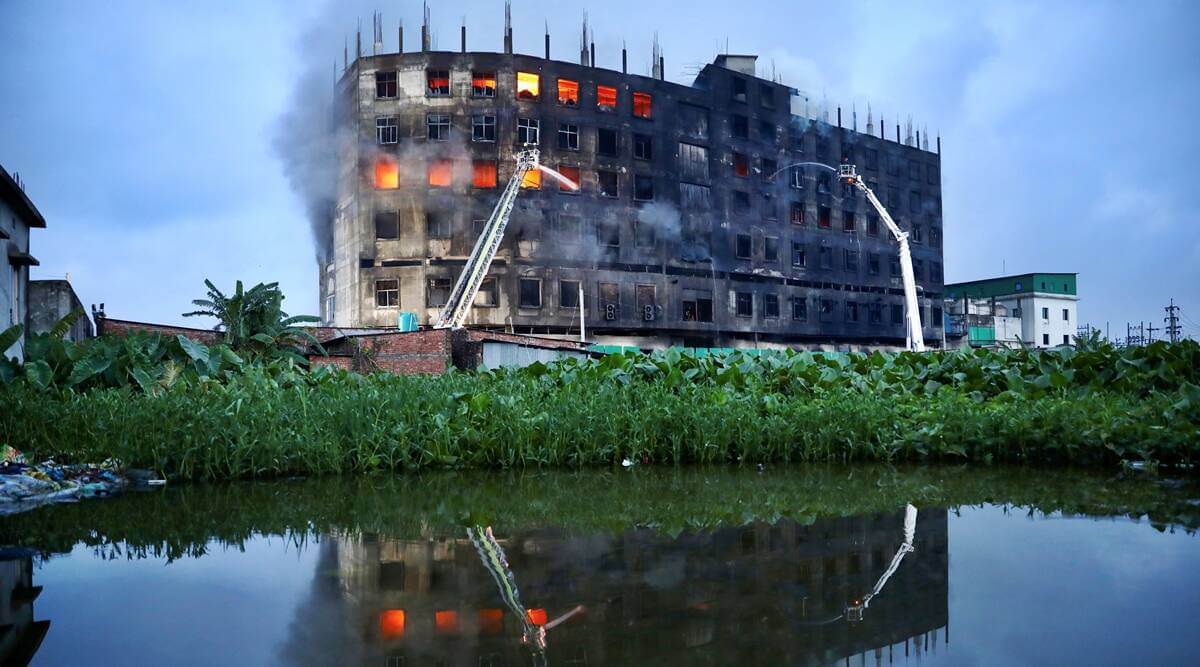Eight people were arrested on Saturday after a major fire ravaged a food and beverage factory at Rupganj in Bangladesh, resulting in the death of at least 52 people.
The Hashem Foods Limited owner, Abul Hashem, who was arrested along with his four sons, claimed that the fire, which broke out on Thursday, could have resulted from the carelessness of the workers. However, The Dawn quoted Jayedul Alam, the police chief for the Narayanganj district, as saying that the incident was “deliberate murder.”
Nevertheless, this has raised doubts about the facility’s adherence to safety protocols. Emergency services said that incident resulted from the highly flammable chemical substances and plastics stored at the facility. The exit door that led to the main staircase was also padlocked, restricting workers from escaping the fire. In addition, the building had only two staircases but should have at least five to adhere to safety requirements.
According to the state’s Labour Minister, Monnujan Sufian, the incident has also resulted in a separate inquiry into the use of child labour at the factory. Evidence shows that children, some aged 11 years, were employed at the facility. During interviews, the relatives of the dead and the survivors mentioned that the factory owners hired several children and paid them merely 24 US cents per hour. Concerningly, the Department of Inspection for Factories and Establishments (DIFE) visited the Hashem Foods Limited facility less than a month ago and raised concerns about the factory’s compliance with safety protocols, including COVID-19 norms. However, following Thursday’s incident, several questions were raised about authorities’ decision to let the factory operate despite its failure to comply with national regulations.
As a result, several labour unions have once again raised concerns about the openly flouted labour and factory laws across workplaces in Bangladesh. According to the International Labour Organisation, the fire “illustrates the urgent need” for authorities and building owners in Bangladesh to ensure compliance with the country’s safety protocols. It added that the Bangladeshi government must “apply renewed vigour in addressing the safety deficits in workplaces across the country.” However, Bangladeshi authorities complain that they cannot conduct extensive reviews specifically in light of the department’s “understaffed manpower.” According to the DIFE, authorities would need to visit 246 factories per day to cover all the registered facilities in a year. With merely 23 district offices, this would be an impossible task to achieve.
Fires and other disasters have been rampant in Bangladesh. In 2013, the Rana Plaza disaster, wherein a building housing a garment factory collapsed and resulted in the death of over a thousand people, attracted international concern. Following this, authorities vowed to enforce safety norms more strictly. However, since then, there has been no significant decline in these incidents. In February 2019, a fire in Dhaka apartments, famous for housing several residential apartments, warehouses, and shops, caused by the illegally stored chemicals, resulted in 70 fatalities.
Corruption and unenforced rules and regulations have led to several deaths during such incidents over the years. These disasters have also attracted international criticism, especially because Bangladesh houses the factories of several global brands. The international attention has resulted in increased compliance, at least in the garment industry. However, the latest incident shows that several other local industries continue to remain far from achieving the required standards. According to the International Labour Organisation’s 2017 report, this results from the Bangladeshi legal framework’s inability to keep up with industrial development.

